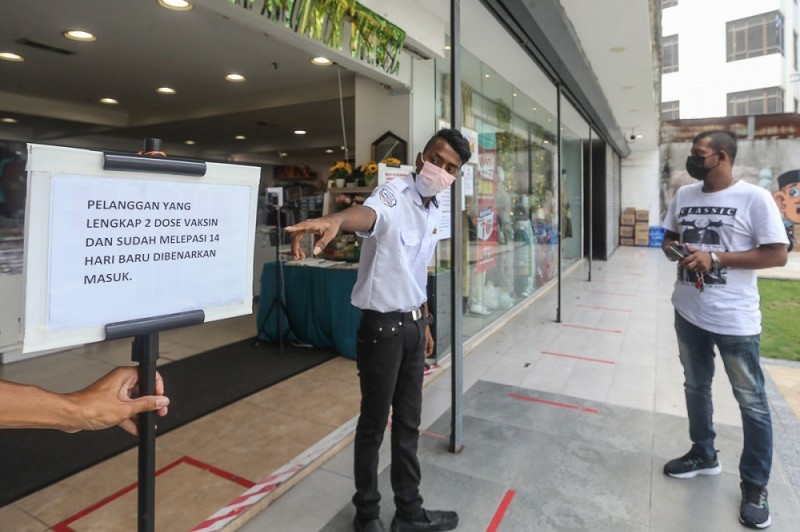
KUALA LUMPUR, Aug 27 — Health experts have welcomed the new freedom afforded to the public under Phase One of the National Recovery Programme (NRP) but insisted these should come with better monitoring, data transparency and enforcement along with rapid vaccination.
Paediatrician Dr Musa Nordin said the move was understandable as the country must eventually wean itself from the lockdowns imposed to contain Covid-19 previously.
Saying these should be in small steps to avoid creating new infection waves, Dr Musa agreed that extending additional freedoms to the fully vaccinated was one such way.
In one of his final measures as the outgoing prime minister, Tan Sri Muhyiddin Yassin announced last week that dine-ins, non-contact sports, and night markets would be allowed to resume operations even in Phase One locations.
“These business outlets should be allowed to operate as usual only if the staff are fully vaccinated with strict observation of the pandemic trio of masking, distancing, and personal hygiene,” Dr Musa said.
However, he said the authorities should also provide the rationale for allowing such activities to resume despite high prevailing Covid-19 numbers so that the public could make informed decisions.
“Explain why and how the selected activities are safe to resume. The public must understand that behavior and infection rates (IR) will be carefully monitored and that tighter restrictions will be re-imposed if there is an increase in risky behavior or IR.
“Good adherence will provide the basis for further relaxation of restrictions and there should be precise and consistent guidance on how infection control can be optimized,” said Dr Musa when contacted.
Khazanah Research Institute’s Nazihah Muhamad Noor said easing restrictions for the fully vaccinated puts Malaysia in line with other countries that have done so such as the US and the UK.
She said that based on granular data, almost all the Covid-19 hospitalisations and deaths were among the unvaccinated group while the fully vaccinated were protected against severe disease.
“If we also look at South Korea, a country which has been able to mostly keep the pandemic under control without severe restrictions, even amidst a surge in cases, it is allowing some relaxation for those who have been fully vaccinated,” she said.
She also pointed out that it was up to the individual to make the personal choice of whether to partake in activities that have been allowed to resume, as even full vaccination did not provide immunity from severe illness, death or even infection.
The relaxation must also not be construed as being allowed to disregard existing protective measures such as wearing masks and maintaining safe physical distancing, she said.
It was also important that both the authorities and the public keep abreast with developments as more sectors reopened, so that both could respond quickly if the situation deteriorated.
“It’s important that we keep closely monitoring real time data e.g. on clusters, variants, transmissibility, hospitalisations and deaths and be prepared to adapt our measures rapidly and accordingly,” she said.
Yesterday, Malaysia reported new records for both new cases and Covid-19 deaths in a day.
Tricia Yeoh from the Institute for Democracy and Economic Affairs (IDEAS) felt blanket lockdowns were already obsolete as a response measure due to the disproportionate harm to society’s most vulnerable groups.
However, she also expressed doubts about authorities’ ability to ensure that only the fully vaccinated were allowed to participate in the reopening of the new business categories.
The common requirement for all the relaxations was that patrons must display their digital vaccination certificates before being allowed to enter, but there have already been news of forgeries and fakes.
“The problem will be whether or not the authorities will be able to enforce the rule of ‘only vaccinated people’.
“It would probably be the case that many unvaccinated people will also be frequenting venues, so we have to take that into our considerations and calculations,” she said.
Yeoh was another that urged the authorities to provide more granular information on the pandemic so that it would be possible to deduce which business activities had higher risks than others.
All three agreed that vaccination efforts should be maintained or intensified, sharing proper data to make informed decisions and continuing to be vigilant with social distancing, masking and good hygiene practices will be the way to overcome this pandemic.
Source: https://www.malaymail.com/news/malaysia/2021/08/27/fine-to-ease-covid-19-curbs-if-reasoning-clearly-explained-say-health-exper/2000755

